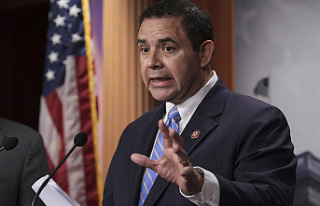WASHINGTON -- Wednesday's White House strategy for handling the next stage of the pandemic was revealed: A road map to living with Covid.
The National COVID-19 Preparation Plan contains a "test-to-treat" approach. This allows pharmacists to quickly issue prescriptions for those who have tested positive. In his State of the Union address to Congress on Tuesday, President Joe Biden highlighted that aspect of the strategy.
Biden and other key administration officials made it clear that they want people to feel comfortable returning to work and resume pre-pandemic activities.
According to Jeff Zients, White House Covid coordinator, the new plan will ensure that vaccines for children under 5 years old are quickly distributed at locations throughout the country as soon as they become available.
These tools allow us to continue protecting people with vaccines, treatments, tests and masks. They allow us to safely move forward and get back into our more normal routines," Zients said. He added that these tools will allow Zients to "go out to eat at restaurants, take that long-awaited trip, arrange a playdate with your children, or attend a sporting game or concert again."
Xavier Becerra, Health and Human Services Secretary, said that the administration coordinates a comprehensive government response to help children who have lost their parents to the virus and vice-versa. He said that this would include financial resources for funeral costs, trauma and grief services.
Zients stated that the new strategy includes a new EPA checklist to clean indoor air in buildings. This will improve indoor air quality through ventilation.
Officials said that Congress will need to provide additional funding for the plan. When reporters asked Zients about the amount, he replied that he had briefed bipartisan leaders on the short-term funding needed. He also noted that the administration would finalize the figures within the next few weeks.
Rochelle Walensky, Centers for Disease Control and Prevention Director, stated that federal officials have dramatically improved their ability to detect new variants and track cases.
When Zients was asked about lifting the mask-wearing requirement on trains and airplanes, Zients stated that the mandate remains in effect until March 18. The administration is currently evaluating the options for addressing these requirements.
The U.S. is now in a transition phase. Some Americans want to go back to normal life. Experts say Covid will be around for the long-term, despite a vaccination rate of only 63 percent. After listening to experts on what the "new norm" should look like, the White House is now using the new approach.
Biden extended Tuesday a 100 percent reimbursement for Covid's emergency response costs to states, tribes, and territories. This is a signal that his administration believes there will be a continuing need for federal resources, even though infection rates are declining across the country. The funds have been used by many states to increase their testing capacities.
Health experts stated that there are obvious actions the federal government can take to establish a lasting infrastructure for detecting and treating Covid ahead of Wednesday's strategy rollout.
"It's not rocket science for you to figure out what is required," Dr. Steven Phillips, vice president of science strategy at Covid Collaboration, an alliance of experts in economics, health, and education, said. Phillips gave a broad interview in which he described how the country could return to pre-pandemic conditions and the way it would look with access to rapid testing and protection for the vulnerable. "Omicron will be with us for quite some time. He said that it was endemicity.
The White House consulted Dr. Peter Hotez (codirector of the Center for Vaccine Development at Texas Children's Hospital), who stated that there should be a plan for communication in case of a new strain of the virus.
He said, "We've seen big waves in South and this summer, I expect another wave." "And, if we don't, we should be expecting another wave in winter. "I don't think this is over, so what's some anticipatory guidance for the American people to let them know that we shouldn't be surprised to see us go back into red?"
Lindsey Dawson, a Kaiser Family Foundation director, stated that the federal government could also provide more guarantees to rapid test manufacturers.
The U.S. was without sufficient testing supplies during the winter holidays. It is important to reassure manufacturers that the government will continue to bulk buy tests. Dawson said that the government sought advice from manufacturers about what it could do to encourage manufacturers to increase supply quickly when necessary.
Phillips stated that once the supply problem is resolved, much of federal government's responsibility will be transferred to the CDC. The CDC will issue a new guidebook on living with Covid. It will include how to use at-home testing kits, and help pave the way to rapid delivery of therapeutics to most vulnerable populations.
We need to be more specific about the protocols and the indications for rapid tests being used in a public-health beneficial way. Dawson stated that he believes we can go further and that the CDC and other scientific organizations could provide guidance to Americans.












